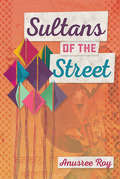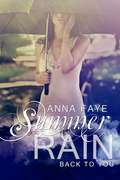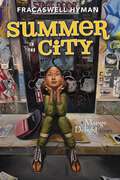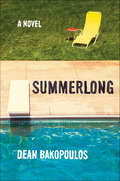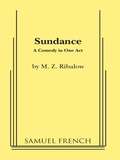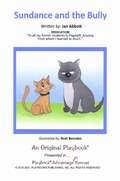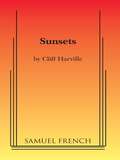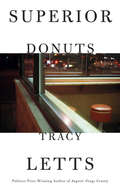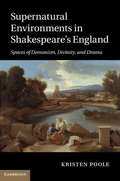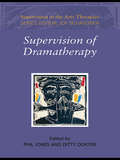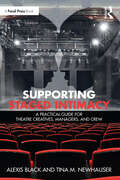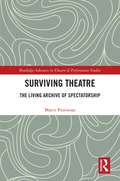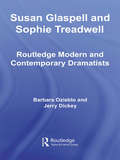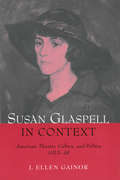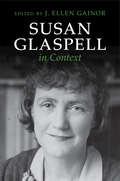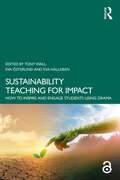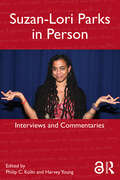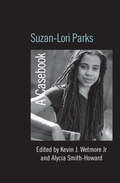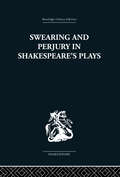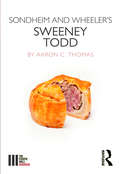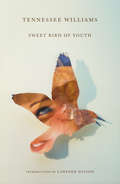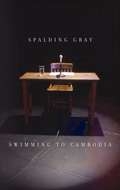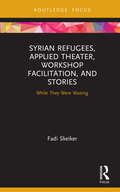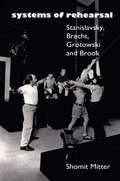- Table View
- List View
Sultans of the Street
by Anusree RoyWhen young orphans Mala and Chun Chun encounter brothers Prakash and Ojha on the busy streets of Kolkata, they are immediately at odds. The brothers come from a lower-middle-class family and spend their time flying kites instead of attending class, while Mala and Chun Chun can only dream of going to school, a goal Aunty promises will be fulfilled if they beg for money from passersby. After a petty fruit-stall heist lands Ojha in Aunty’s cunning hands, the brothers are blackmailed into begging alongside Mala and Chun Chun, forcing the children to interact. Though they find each other nuisances at first, the kids soon realize their strength in numbers as Aunty’s scheming is slowly revealed.
Summer Rain - Back to you
by Charlotte Forsdick Anna Winter / Anna FayeThe young Skyler Montrose turned her back on her hometown Bozeman years ago. Back then a scandal had shaken the sleepy Montana town. A scandal in which Skyler’s family was involved. But the events of the past still cast their shadows on another person: Mark Chastain. The one time star quarterback has become a successful businessman. When Skyler returns to Bozeman it is not only the old secrets of a youthful indiscretion that boil up again, but also a few old unrequited feelings.
Summer in the City (Mango Delight #2)
by Fracaswell HymanGet ready, world—Mango&’s about to become a STAR! In this sequel to Mango Delight, the delightful heroine&’s adventures—and misadventures—continue as she prepares to make her off-Broadway debut. Where Mango goes, drama is sure to follow! It&’s summer break, and Mango is content to spend her time babysitting her brother, hanging with her friend Izzy, and binge-watching movies late into the night. Then she runs into her drama teacher, who has some big news: their middle school play Yo, Romeo! is headed to the stage in New York City . . . and he wants Mango for the lead role! After overcoming her mom&’s initial reluctance—and with some firm rules established—Mango goes off to Brooklyn to stay with her Aunt Zendaya in a teeny apartment and prepare for her theatrical debut. It&’s the opportunity of a lifetime, but soon Mango must confront homesickness, insecurity, and the all-important question of what it means to be a good friend—especially when you&’re far away from the people you love.
Summerlong: A Novel
by Dean BakopoulosThe author of Please Don’t Come Back from the Moon and My American Unhappiness delivers his breakout novel: a deft and hilarious exploration of the simmering tensions beneath the surface of a contented marriage which explode in the bedrooms and backyards of a small town over the course of a long, hot summer.In the sweltering heat of one summer in a small Midwestern town, Claire and Don Lowry discover that married life isn’t quite as they’d predicted.One night Don, a father of three, leaves his house for an evening stroll, only to wake up the next morning stoned, and sleeping in a hammock next to a young woman he barely knows. His wife, Claire, leaves the house on this same night to go on a midnight run—only to find herself bumming cigarettes and beer outside the all-night convenience store.As the summer lingers and the temperature rises, this quotidian town’s adults grow wilder and more reckless while their children grow increasingly confused. Claire, Don, and their neighbors and friends find themselves on an existential odyssey, exploring the most puzzling quandaries of marriage and maturity. When does a fantasy become infidelity? When does compromise become resentment? When does routine become boring monotony? Can Claire and Don survive everything that befalls them in this one summer, forgive their mistakes, and begin again?Award-winning writer Dean Bakopoulos delivers a brutally honest and incredibly funny novel about the strange and tenuous ties that bind us, and the strange and unlikely places we find connection. Full of mirth, melancholy, and redemption, Summerlong explores what happens when life goes awry.
Sundance
by Meir Z. RibalowComedy / 5 m. / Simple int. / Takes place in a sort of metaphysical wild west saloon. The characters include Hickock, Jesse, the Kid and the inevitable Barkeep. Hickock kills to uphold the law. Jesse kills for pleasure. The Kid kills to bring down The Establishment. What if, wonders the Barkeep, they met up with the Ultimate Killer-- who kills for no reason, who kills simply because that's what he does? Enter Sundance. He does not kill to uphold the law, for pleasure, or to make a political statement, or because he had a deprived childhood. He kills for no reason at all. And he proceeds to kill everyone, exiting at the end with his sixguns blazing! / "Witty, strong, precise, unusually well written."-- Guardian. / This co winner of the 1981 Annual NYC Metropolitan Short Play Festival has been a success in 6 countries!
Sundance and the Bully
by Jan AbbottWelcome to the world of Playbooks® and the beginning of a wonderful role-play reading adventure! Playbooks® stories are presented in a unique and colorful format and are read out loud by several readers like a play, without memorization, props, or a stage. <p><p>When you read a Playbook®, you and other readers bring the story to life and become the characters. As you read your part out loud, you will have fun expressing and acting like your character. You and the other readers will explore the story plot together and learn what will happen next. It's an exciting journey of discovery that pulls you into the story, and you'll want to read it out loud again and again!
Sunsets
by Cliff HarvilleThis collection consists of four short plays: George L. Smith (Monologue / 1m), A Silent Catastrophe (One Act / 1m, 1f / Interior), Sara Hubbard (Monologue / 1f), and Hang Me My Afghan (One Act / 1m, 1f / Interior)
Superior Donuts
by Tracy Letts"It is a meditation on Chicago's old soul . . . a witty, seductive, live-wire and greatly entertaining dark comedy that you just don't want to end." -Chicago Tribune"The sting, the speed and marksmanship of the gimcracks his characters fire at each other . . . drips the kind of soulful, energized sarcasm that has long characterized [Letts'] work as an actor and playwright."-Time Out Chicago Tracy Letts, who won the 2008 Pulitzer Prize for his epic, caustic Oklahoma family drama August: Osage County, has shifted gears with this entertaining comedy set in a donut shop. A love letter to the city where he has lived for more than twenty years, Letts describes his new work as "an exploration of the Chicago storefront experience." The play takes place in the north side neighborhood of Uptown, where Arthur Przybyszewski runs the donut shop that has been in his family for sixty years. More content to spend the day smoking weed and reminiscing about his Polish immigrant father, Arthur hires a shop assistant, the young African American Franco Wicks, who has both an unpublished novel and unpaid gambling debt. Superior Donuts premiered at Steppenwolf Theatre Company and recently opened on Broadway--following the same path of success as Letts' previous work.Tracy Letts is the author of Killer Joe, Bug, Man from Nebraska (nominated for the 2004 Pulitzer Prize), and August: Osage County (awarded the 2008 Pulitzer Prize for Drama). He is a member of Chicago's Steppenwolf Theatre Company.
Supernatural Environments in Shakespeare's England: Spaces of Demonism, Divinity, and Drama
by Kristen PooleBringing together recent scholarship on religion and the spatial imagination, Kristen Poole examines how changing religious beliefs and transforming conceptions of space were mutually informative in the decades around 1600. Supernatural Environments in Shakespeare's England explores a series of cultural spaces that focused attention on interactions between the human and the demonic or divine: the deathbed, purgatory, demonic contracts and their spatial surround, Reformation cosmologies and a landscape newly subject to cartographic surveying. It examines the seemingly incongruous coexistence of traditional religious beliefs and new mathematical, geometrical ways of perceiving the environment. Arguing that the late sixteenth- and early seventeenth-century stage dramatized the phenomenological tension that resulted from this uneasy confluence, this groundbreaking study considers the complex nature of supernatural environments in Marlowe's Doctor Faustus and Shakespeare's Othello, Hamlet, Macbeth and The Tempest.
Supervision of Dramatherapy (Supervision in the Arts Therapies)
by Phil Jones Ditty DokterSupervision of Dramatherapy offers a thorough overview of dramatherapy supervision and the issues that can arise during the supervisory task. Phil Jones and Ditty Dokter bring together experts from the field to examine supervision in a range of contexts with different client groups, including dramatherapy with children, forensic work, and intercultural practice. Each chapter features: theoretical grounding the importance of action methods position in the professional lifecycle application in relation to setting and client groups. Using illustrative examples, Supervision of Dramatherapy provides practical guidance and theoretical grounding, appealing to supervisors and supervisees alike, as well as psychotherapists interested in the use of dramatic methods in the supervisory setting.
Supporting Staged Intimacy: A Practical Guide for Theatre Creatives, Managers, and Crew
by Alexis Black Tina M. NewhauserSupporting Staged Intimacy: A Practical Guide for Theatre Creatives, Managers, and Crew examines the relationship between staged intimacy, intimacy direction, and those supporting the process during pre-production, rehearsal, and performance. First, this book addresses challenges and trends in staging intimacy, helping backstage and offstage theatre artists recognize the problematic approaches and culture that led to the emerging field of intimacy direction. This text will then provide tools and recommended practices for supporting the creation and maintaining of staged intimacy, enabling team members to enact contemporary protocols concerning advocacy and agency. Finally, this book will educate and empower readers with the necessary skills to prompt change; by providing modern techniques, essential workplace protocols, and achievable action items, this book will transform the way theatre designers, managers, crew, and other creative team members engage with theatrical consent. Supporting Staged Intimacy is written for every pre-professional and professional artist working behind the scenes who wish to better support consensual workplaces, physically intimate stories, and the individuals telling those stories.
Surviving Theatre: The Living Archive of Spectatorship (Routledge Advances in Theatre & Performance Studies)
by Marco PustianazWritten soon before and in the middle of the Covid-19 pandemic when theatre ground to a halt and spectatorship was suspended, this book takes stock of spectatorship as theatre’s living archive and affirms its value in the midst of the present crisis. Drawing from a manifold affective archive of performances and installations by Marina Abramović, Ron Athey, Forced Entertainment, Socìetas Raffaello Sanzio, Blast Theory, LIGNA, Doris Salcedo, Graeme Miller, Lenz Rifrazioni, Cristina Rizzo ..., and expanding on the work of many theorists and scholars like Roland Barthes and Jacques Rancière, Giorgio Agamben and Alain Badiou, Nicholas Ridout and Alan Read, among others, the book focuses on the spectator as the subject, rather than the object, of investigation. This is the right time to remember their secret power and theorise their collective time in the theatre. This book is an archive of their adventure and a manifesto rooted in their potentiality. It boldly posits the spectator as the inaugurator of theatre, the surplus that survives it. The book will be of great interest to spectators all and sundry, to scholars and students of theatre and performance studies, of spectatorship and politics.
Susan Glaspell and Sophie Treadwell (Routledge Modern and Contemporary Dramatists)
by Barbara Ozieblo Jerry DickeySusan Glaspell and Sophie Treadwell presents critical introductions to two of the most significant American dramatists of the early twentieth century. Glaspell and Treadwell led American Theatre from outdated melodrama to the experimentation of great European playwrights like Ibsen, Strindberg and Shaw. This is the first book to deal with Glaspell and Treadwell’s plays from a theatrical, rather than literary, perspective, and presents a comprehensive overview of their work from lesser known plays to seminal productions of Trifles and Machinal. Although each woman pursued her own themes, subjects and manner of stage production, this shared volume underscores the theatrical and cultural conditions influencing female playwrights in modern America.
Susan Glaspell in Context
by J. Ellen GainorSusan Glaspell in Context not only discusses the dramatic work of this key American author -- perhaps best known for her short story "A Jury of Her Peers" and its dramatic counterpart,Trifles-- but also places it within the theatrical, cultural, political, social, historical, and biographical climates in which Glaspell's dramas were created: the worlds of Greenwich Village and Provincetown bohemia, of the American frontier, and of American modernism. J. Ellen Gainor is Professor of Theatre, Women's Studies, and American Studies, Cornell University. Her other books include Performing America: Cultural Nationalism in American Theater (co-edited with Jeffrey D. Mason) from the University of Michigan Press.
Susan Glaspell in Context (Literature in Context)
by J. Ellen GainorSusan Glaspell in Context provides new, accessible, and informative essays by leading international scholars and artists on Pulitzer Prize winner Susan Glaspell's life, career development, writing, and ongoing global creative impact. The collection features wide-ranging discussions of Glaspell's fiction, plays, and non-fiction in both historical and contemporary critical contexts, and demonstrates the significance of Glaspell's writing and other professional activities to a range of academic disciplines and artistic engagements. The volume also includes the first analyses of six previously unknown Glaspell short stories, as well as interviews with contemporary stage and film artists who have produced Glaspell's works or adapted them for audiences worldwide. Organized around key locations, influences, and phases in Glaspell's career, as well as core methodological and pedagogical approaches to her work, the collection's thirty-one essays place Glaspell in historical, geographical, political, cultural, and creative contexts of value to students, scholars, teachers, and artists alike.
Sustainability Teaching for Impact: How to Inspire and Engage Students Using Drama
by Tony Wall Eva Österlind Eva HallgrenSustainability Teaching for Impact is an essential step-by-step, practical guide for those wanting to inspire and engage higher education students in the areas of sustainability.This book encourages new and experienced university teachers across disciplines to adopt and adapt dramatic methods, with a view to develop their teaching. It introduces applied drama and performance arts methods that have been tried-and-tested across disciplines to deepen and broaden sustainability knowledge, skills, mindsets, and practices. Sustainability Teaching for Impact assumes no previous experience of the methods, as university teachers – with and without experience in drama – carefully walk you through some of the teaching practices they have used to create an impact in their teaching.This book is for higher and further education tutors who wish to build on their experience and deliver exciting and accessible classroom techniques and practices that are highly interactive, creative, and engaging to help further the teaching of sustainability.The Open Access version of this book, available at www.taylorfrancis.com, has been made available under a Creative Commons Creative Commons Attribution (CC-BY) 4.0 license.
Suzan-Lori Parks in Person: Interviews and Commentaries
by Philip C. Kolin Harvey YoungThis collection of interviews offers unprecedented insight into the plays and creative works of Suzan-Lori Parks, as well as being an important commentary on contemporary theater and playwriting, from jazz and opera to politics and cultural memory. Suzan-Lori Parks in Person contains 18 interviews, some previously untranscribed or specially undertaken for this book, plus commentaries on her work by major directors and critics, including Liz Diamond, Richard Foreman, Bonnie Metzgar and Beth Schachter. These contributions combine to honor the first African American woman to receive the Pulitzer Prize in drama, and explore her ideas about theater, history, race, and gender. Material from a wide range of sources chronologically charts Parks’s career from the 1990s to the present. This is a major collection with immediate relevance to students of American/African-American theater, literature and culture. Parks’s engaging voice is brought to the fore, making the book essential for undergraduates as well as scholars.
Suzan-Lori Parks: A Casebook (Casebooks on Modern Dramatists)
by Kevin J. Wetmore Jr Alycia Smith-HowardSuzan-Lori Parks confirmed herself as one of the most exciting and successful playwrights of her generation when her work Topdog/Underdog was awarded the 2002 Pulitzer Prize, making her the only African American woman to win the award. Despite the cultural weight of this achievement, Parks remains difficult both to pigeonhole and to summarize. This volume seeks to provide a context for her work, with essays from major and emerging scholars addressing the importance of factors such as gender, ethnicity, language and history in plays from her first major work, Imperceptible Mutabilities of the Third Kingdom to the 365 Days / 365 Plays project. Suzan-Lori Parks: A Casebook represents the first major study of this unique voice in contemporary drama. Contributors: Leonard Berkman, Jason Bush, Shawn Marie-Garrett, Andrea Goto, Heidi Holder, Barbara Ozieblo, Kevin J. Wetmore Jr and Harvey Young. Kevin J. Wetmore Jr is Professor of Theatre at Loyola Marymount University, as well as being a professional actor and director of the Comparative Drama Conference. He is the author of The Athenian Sun in an African Sky and Black Dionysus: Greek Tragedy and African American Theatre. Alycia Smith-Howard an Assistant Professor at New York University in the Gallatin School of Individualized Study, where she is the Artistic Director of the Gallatin Arts Festival and the Book Reviews Editor at the New England Theatre Journal. A Fellow of the Folger Shakespeare Library, her areas of specialization include Shakespeare, performance history, feminist theatre aesthetics and literature and drama of the south.
Swearing and Perjury in Shakespeare's Plays (Routledge Library Editions Shakespeare #XXXIII)
by Frances A ShirleyFirst published in 1979. How do the elements of swearing and perjury work in Shakespeare's plays? What effect did Shakespeare intend when he wrote them? How did they contribute to the delineation of character? These questions are investigated by combining a history of ideas approach with close textual analysis. The book begins by bringing together material from a wide range of contemporary sources in order to create a sense of popular awareness of oaths in Queen Elizabeth's time. Out of this emerges a scale of the relative strength of various oaths, an awareness of the ways in which people regarded perjury, and an appreciation of the attempts to prohibit profanity. Shakespeare's work is then examined against this background.
Sweat
by Lynn NottageLynn Nottage has written one of her most exquisitely devastating tragedies to date. In one of the poorest cities in America, Reading, Pennsylvania, a group of down-and-out factory workers struggle to keep their present lives in balance, ignorant of the financial devastation looming in their near future. Based on Nottage’s extensive research and interviews with residents of Reading, Sweat is a topical reflection of the present and poignant outcome of America’s economic decline. <p><p> Lynn Nottage is the recipient of two Pulitzer Prize Awards for Drama for Sweat and Ruined. She is the first woman playwright to be honored twice. Her other plays include Intimate Apparel; By the Way, Meet Vera Stark; Fabulation, or the Re-Education of Undine; Crumbs from the Table of Joy; and Las Meninas.
Sweeney Todd
by Aaron C. ThomasSweeney Todd, the gruesome tale of a murderous barber and his pastry chef accomplice, is unquestionably strange subject matter for the musical theatre – but eight Tony awards and enormous successes on Broadway and the West End testify to its enduring popularity with audiences. Written by Hugh Wheeler, with music and lyrics by Stephen Sondheim, the musical premiered in 1979 and has seen numerous revivals, including Tim Burton's 2007 film version. Aaron C. Thomas addresses this darkly funny piece with fitting humour, taking on Sweeney Todd’s chequered history and genre, its treatment of violence and cannibalism, and its sexual politics.
Sweet Bird of Youth
by Tennessee Williams Landford WilsonNow with an insightful new introduction, the author's original Foreword, and the one-act play, The Enemy: Time, on which Sweet Bird of Youth was based. Tennessee Williams knew how to tell a good tale, and this steamy, wrenching play about a faded movie star, Alexandra Del Lago, and about the lost innocence and corruption of Chance Wayne, reveals the dark side of the American dreams of youth and fame. Distinguished American playwright Lanford Wilson has written an insightful Introduction for this edition. Also included are Williams' original Foreword to the play; the one-act play The Enemy: Time--the germ for the full-length version, published here for the first time; an essay by Tennessee Williams scholar, Colby H. Kullman; and a chronology of the author's life.
Swimming to Cambodia
by Roger Rosenblatt Spalding Gray James Leverett"It took courage to do what Spalding did--courage to make theatre so naked and unadorned, to expose himself in this way and fight the demons in public. In doing so, he entered our hearts--my heart--because he made his struggle my struggle. His life became my life."--Eric Bogosian"Virtuosic. A master writer, reporter, comic and playwright. Spalding Gray is a sit-down monologist with the soul of a stand-up comedian. A contemporary Gulliver, he travels the globe in search of experience and finds the ridiculous."--The New York TimesIn 2004, we mourned the loss of one of America's true theatrical innovators. Spalding Gray took his own life by jumping from the Staten Island ferry into the waters of New York Harbor, finally succumbing to the impossible notion that he could in fact swim to Cambodia. At a memorial gathering for family, friends and fans at Lincoln Center in New York, his widow expressed the need to honor Gray's legacy as an artist and writer for his children, as well as for future generations of fans and readers. Originally published in 1985, Swimming to Cambodia is reissued here 20 years later in a new edition as a tribute to Gray's singular artistry.Writer, actor and performer, Spalding Gray is the author of Sex and Death to the Age 14; Monster in a Box; It's a Slippery Slope; Gray's Anatomy and Morning, Noon and Night, among other works. His appearance in The Killing Fields was the inspiration for his Swimming to Cambodia, which was also filmed by Jonathan Demme.
Syrian Refugees, Applied Theater, Workshop Facilitation, and Stories: While They Were Waiting
by Fadi SkeikerThis book analyzes and theorizes the efficacy of using applied theater as a tool to address refugee issues of displacement, trauma, adjustment, and psychological well-being, in addition to split community belonging. Fadi Skeiker connects refugee narratives to the themes of imagination, home, gender, and conservatism, among others. Each chapter outlines the author’s applied theater practice, as a Syrian, with and for Syrian refugees in the countries of Jordan, Germany, and the United States. This book will be of great interest to scholars, students, and practitioners of applied theater studies and refugee studies.
Systems of Rehearsal: Stanislavsky, Brecht, Grotowski, and Brook
by Shomit MitterThe gap between theory and practice in rehearsal is wide. many actors and directors apply theories without fully understanding them, and most accounts of rehearsal techniques fail to put the methods in context. Systems of Rehearsal is the first systematic appraisal of the three principal paradigms in which virtually all theatre work is conducted today - those developed by Stanislavsky, Brecht and Grotowski. The author compares each system ot the work of the contemporary director who, says Mitter, is the Great Imitator of each of them: Peter Brook. The result is the most comprehensive introduction to modern theatre available.
